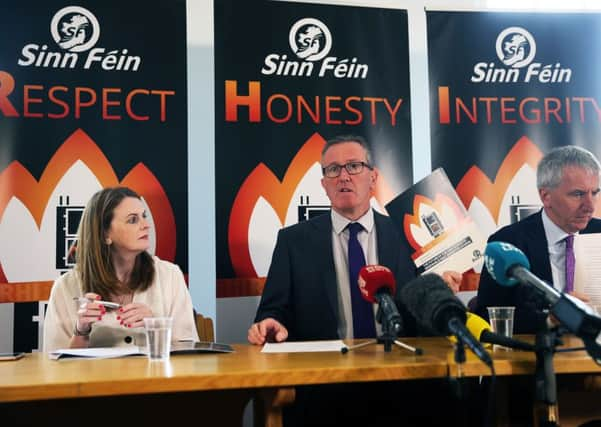Sinn Féin RHI plan would mean no compensation for most RHI claimants


The party’s proposed solution to the cash for ash scandal, which it published yesterday, would see a maximum of £6 million spent on compensating RHI claimants who would be told that what they were told would be guaranteed 20-year payments would end in March.
If that £6 million was split equally between the 2,128 non-domestic RHI claimants, it would mean payments of just £2,819 each. However, the payments would be determined based on the cost of installing a boiler and would not go to anyone who has already received more than that sum, even though the scheme was sold as providing the cost of the boiler, a rate of return on the investment and money to pay for intangibles such as “hassle” involved with the system.
Advertisement
Hide AdAdvertisement
Hide AdIn reality, the proposal would mean that most people would receive no compensation when the scheme ends because they have already received the capital cost of their boiler under the early years of the scheme.
Sinn Féin said that “the expectation of a 12% return should never have been given in the first place and should not be met”, but added: “Consideration could however be given to participants who are out of pocket for their capital investment and who can demonstrate they did not game or abuse the scheme. Meeting these expenses would cost a maximum of £6m...”
When the now Sinn Féin vice president Michelle O’Neill was agriculture minister, her officials were promoting the scheme, urging farmers to install boilers and distributing literature which assured them of a guaranteed 20-year subsidy.
That has repeatedly been raised at Sir Patrick Coghlin’s public inquiry into the scandal, although there has been no suggestion that either the agriculture officials or Ms O’Neill were aware of the scheme being abused.
Advertisement
Hide AdAdvertisement
Hide AdLast night Andrew Trimble of the Renwable Heat Association, which represents many boiler owners, said that even the slightly less blunt proposals from the Department for the Economy for cutting subsidies further would be “catastrophic” for honest claimants.
He said: “Scheme participants would receive compensation that would not pay off their debt nor cover the borrowings and additional costs of operating these green energy systems over the six years of the ‘guaranteed’ 20-year period.
“It is unreasonable and unfair that the litany of mistakes made by the department will result in a multi-million pound loss by legitimate scheme participants.”
Sinn Féin argued in response to the department’s public consultation that although slashing the RHI subsidy still further would ensure that there is no longer any overspend from Stormont’s budget, it would not completely eliminate the potential for abuse and would require RHI boilers to be monitored and inspected for a further 17 years, “entailing bureaucracy and expense.
Advertisement
Hide AdAdvertisement
Hide AdMaintaining any payments under the existing scheme would also mean that key flaws in the scheme – such as the potential to ‘game’ it by installing multiple small boilers on a higher subsidy, rather than one large boiler on a lower rate – would remain.
And it said that “RHI may not be merely ineffective in lowering carbon emissions but counter-productive. This is because the carbon-friendly credentials of the wood pellets subsidised by RHI are strongly contested within the scientific community”.
Citing numerous academic papers which have questioned the supposed environmental benefits of burning wood, Sinn Fein said that “in summary, burning wood exacerbates global warming in the short to medium term in the hope of uncertain benefits over the distant future. Such a risky and controversial strategy does not represent a good use of scarce public resources.”
Sinn Féin’s response said: “There are various ways of closing RHI. Participants could be bought out on a voluntary basis. Under the proposal in the consultation document a 12% return would be offered up-front to participants who have not already earned this return.
Advertisement
Hide AdAdvertisement
Hide Ad“Those who accept the up-front fee would leave the scheme and receive no further payments. Meanwhile, participants who have already earned their 12% return would remain on the scheme and continue to receive payments. RHI would continue to exist but with slightly fewer participants. It is difficult to see the appeal of this approach.
“Under the compulsory buy-out option the scheme would cease to exist and all participants would be reimbursed for their capital expenses plus 12%, unless they have already earned this amount. This would cost approximately £63m...spending a further £63m on such a flawed scheme would be deeply unsatisfactory but this option would at least leave circa £424m in the AME budget.
“Negotiations could then be initiated with the British Treasury on using this funding for a new scheme that more effectively meets the original aims of promoting renewable heat and carbon reduction.”
It said “the most straightforward way to close RHI is to simply allow the current regulations to expire in March 2019 and to not replace them”. This would mean the scheme no longer exists and no further payments would be required.”
The party also advocated ways of clawing back payments made to those who abused the scheme, but did not offer any specific mechanisms for doing so.